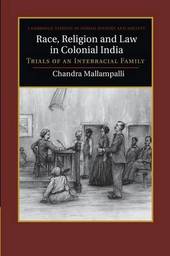
|
Race, Religion and Law in Colonial India: Trials of an Interracial Family
Paperback / softback
Main Details
| Title |
Race, Religion and Law in Colonial India: Trials of an Interracial Family
|
| Authors and Contributors |
By (author) Chandra Mallampalli
|
| Series | Cambridge Studies in Indian History and Society |
|---|
| Physical Properties |
| Format:Paperback / softback | | Pages:288 | | Dimensions(mm): Height 229,Width 152 |
|
| Category/Genre | Asian and Middle Eastern history
Colonialism and imperialism |
|---|
| ISBN/Barcode |
9781107487543
|
| Classifications | Dewey:346.5487052 |
|---|
| Audience | | Professional & Vocational | |
|---|
| Illustrations |
3 Maps; 6 Halftones, unspecified
|
|
Publishing Details |
| Publisher |
Cambridge University Press
|
| Imprint |
Cambridge University Press
|
| Publication Date |
5 February 2015 |
| Publication Country |
United Kingdom
|
Description
How did British rule in India transform persons from lower social classes? Could Indians from such classes rise in the world by marrying Europeans and embracing their religion and customs? This book explores such questions by examining the intriguing story of an interracial family who lived in southern India in the mid-nineteenth century. The family, which consisted of two untouchable brothers, both of whom married Eurasian women, became wealthy as distillers in the local community. A family dispute resulted in a landmark court case, Abraham v. Abraham. Chandra Mallampalli uses this case to examine the lives of those involved, and shows that far from being products of a 'civilizing mission' who embraced the ways of Englishmen, the Abrahams were ultimately - when faced with the strictures of the colonial legal system - obliged to contend with hierarchy and racial difference.
Author Biography
Chandra Mallampalli is Associate Professor of History at Westmont College. His publications include Christians and Public Life in Colonial South India, 1863-1937 (2004).
Reviews'Mallampalli has produced a marvelous work of legal ethnography that enriches our historical understanding of the dynamics of interracial marriage and the relationships of religion, race, and social standing. His book speaks to crucial themes of British colonial rule and the texture of the lives of those who lived under its authority.' James Epstein, Victorian Studies
|